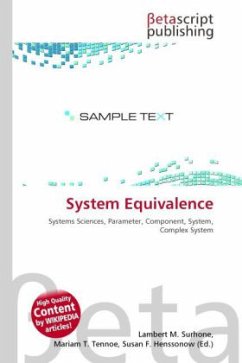
System Equivalence
Versandkostenfrei!
Versandfertig in 6-10 Tagen
23,99 €
inkl. MwSt.

PAYBACK Punkte
12 °P sammeln!
High Quality Content by WIKIPEDIA articles! In the systems sciences the term system equivalence is the notion that a parameter or component of a system behaves in a similar way as a parameter or component of a different system. Similarity means that mathematically the parameters/components will be indistinguishable from each other. Equivalence can be very useful in understanding how complex systems work. Examples of equivalent systems are first- and second-order mechanical, electrical, torsional, fluidic, and caloric systems. Equivalent systems are mostly used to change large and expensive mec...
High Quality Content by WIKIPEDIA articles! In the systems sciences the term system equivalence is the notion that a parameter or component of a system behaves in a similar way as a parameter or component of a different system. Similarity means that mathematically the parameters/components will be indistinguishable from each other. Equivalence can be very useful in understanding how complex systems work. Examples of equivalent systems are first- and second-order mechanical, electrical, torsional, fluidic, and caloric systems. Equivalent systems are mostly used to change large and expensive mechanical, thermal, and fluid systems into a simple, cheaper electrical system. Then the electrical system can be analyzed to validate that the system dynamics will work as designed. This is a preliminary inexpensive way for engineers to test that their complex system performs the way they are expecting.












